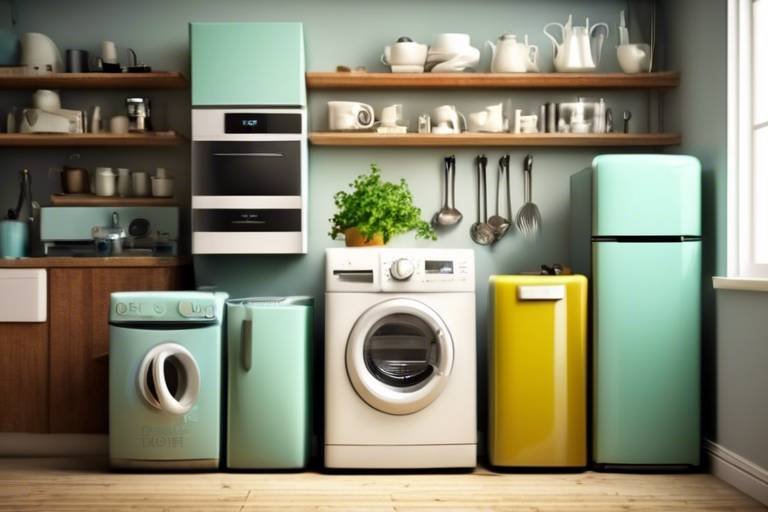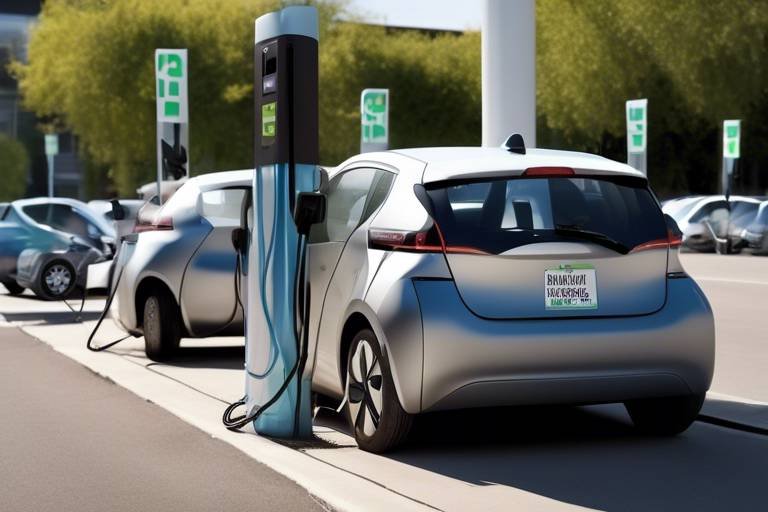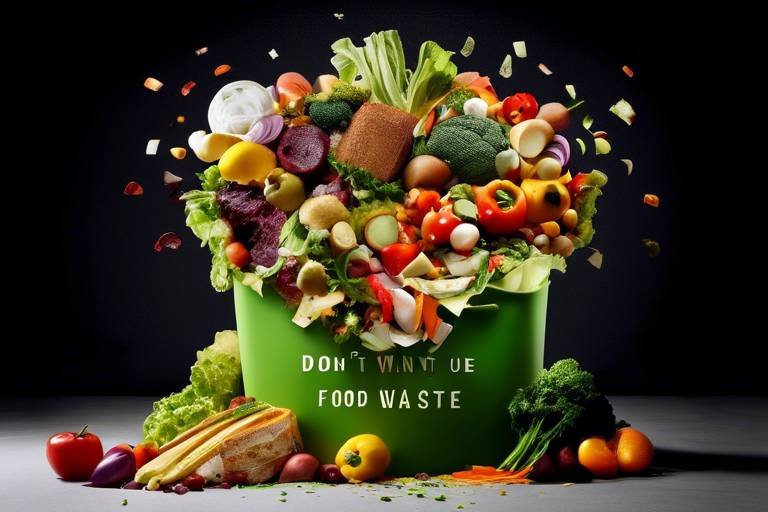How to Choose Sustainable Home Appliances?
In today's world, where environmental concerns are at the forefront of our minds, choosing sustainable home appliances has become more important than ever. It's not just about reducing your carbon footprint; it's about making informed decisions that contribute to a healthier planet. With so many options available, how do you know which appliances are truly eco-friendly? This article will guide you through the essential criteria for selecting sustainable home appliances, focusing on energy efficiency, materials used, and certifications that ensure you're making a positive impact.
When it comes to selecting appliances, think of them as investments in your home and the environment. Just like you wouldn't buy a car without checking its fuel efficiency, the same principle applies to home appliances. You want to look for products that not only perform well but also minimize energy and water usage. By making these conscious choices, you're not only saving money on utility bills but also contributing to a more sustainable future.
As you navigate the world of sustainable appliances, consider the following key factors:
- Energy Efficiency: Look for appliances with high energy efficiency ratings, which indicate lower energy consumption.
- Material Composition: Choose appliances made from recyclable and non-toxic materials.
- Certifications: Familiarize yourself with eco-labels that signify adherence to sustainability standards.
By keeping these criteria in mind, you can make choices that align with your values and support a sustainable lifestyle. Ready to dive deeper into the specifics? Let's explore energy efficiency ratings, the impact of materials, and how to ensure your appliances are both effective and environmentally friendly!
Energy efficiency ratings are crucial for evaluating appliances. These ratings provide a clear indication of how much energy an appliance uses compared to its peers. For example, appliances that are ENERGY STAR certified are designed to consume less energy, which can lead to significant savings on your energy bills. When shopping, look for the EnergyGuide label, which gives you an estimate of the annual energy costs associated with the appliance.
Understanding these ratings can feel overwhelming, but think of it as a guide. Just like a map helps you navigate a new city, energy ratings help you find the most efficient appliances. By choosing appliances with higher ratings, you’re not just saving money; you’re also reducing greenhouse gas emissions, making a positive contribution to the environment.
The materials used in home appliances significantly affect sustainability. When selecting appliances, consider those made from eco-friendly, recyclable, and non-toxic materials. For instance, appliances made from stainless steel or recycled plastic are often more sustainable than those made from virgin plastic. Not only do these materials have a lower environmental impact, but they also tend to be more durable, which means they last longer and reduce waste.
Recyclability is an essential factor when selecting appliances. Many components of appliances, such as metals, plastics, and glass, can be recycled. By choosing appliances that prioritize recyclable materials, you are helping to close the loop in the manufacturing cycle. This means that when the appliance reaches the end of its life, its components can be repurposed rather than ending up in a landfill.
Understanding the end-of-life recycling process helps consumers choose appliances that can be disposed of responsibly. Many manufacturers now offer take-back programs, allowing you to return old appliances for proper recycling. This not only reduces landfill waste but also promotes a circular economy, where materials are reused and recycled continuously.
Many manufacturers now offer recycling programs for their products. These initiatives not only benefit the environment but also provide consumers with an easy way to dispose of old appliances. For example, companies like LG and Samsung have introduced programs that allow customers to send back old appliances for recycling. Participating in these programs is a simple yet impactful way to contribute to sustainability.
Certifications provide assurance that an appliance meets specific sustainability standards. When shopping for eco-friendly appliances, look for certifications such as ENERGY STAR, Green Seal, and UL Environment. These labels indicate that the appliance has been tested and verified for energy efficiency and environmental safety. Knowing what to look for can make your shopping experience easier and more rewarding.
Water efficiency is another critical aspect of sustainability. With the increasing scarcity of freshwater resources, choosing appliances that minimize water usage is essential. Look for appliances that are designed to use less water without compromising performance. For instance, modern dishwashers and washing machines are engineered to be highly efficient, using significantly less water than older models.
Water-saving appliances can significantly reduce household water consumption. When selecting a dishwasher or washing machine, check for models that have the WaterSense label, which indicates that they meet water efficiency criteria set by the Environmental Protection Agency (EPA). By choosing these appliances, you not only save water but also reduce your utility bills.
Smart appliances with water management features can further enhance sustainability. Many modern appliances come equipped with sensors that monitor water usage and adjust settings accordingly. For example, some washing machines can detect the size of the load and use only the necessary amount of water. This technology helps you conserve water without sacrificing performance, making it a win-win for both you and the planet.
Investing in durable appliances can lead to a more sustainable home. When evaluating appliances, consider factors such as build quality, materials, and brand reputation. Durable appliances not only last longer but also reduce the frequency of replacements, which in turn reduces waste. Remember, a well-made appliance is an investment that pays off in the long run.
A robust warranty and reliable support services are indicators of appliance durability. When shopping for appliances, look for warranties that extend beyond the standard one-year period. A longer warranty often signifies that the manufacturer stands behind their product, indicating that it is built to last. Additionally, consider brands that offer comprehensive customer support, which can help you with any issues that arise over the appliance's lifetime.
Choosing appliances that are easy to repair can extend their lifespan. Before purchasing, research the availability of replacement parts and whether the manufacturer provides repair manuals or guides. Appliances that are designed with repairability in mind not only save you money but also contribute to sustainability by reducing waste. Think of it as giving your appliance a second chance at life!
1. What are the benefits of choosing sustainable home appliances?
Choosing sustainable appliances can lead to lower energy and water bills, reduced environmental impact, and a healthier home. They often come with advanced features that enhance performance while conserving resources.
2. How can I identify energy-efficient appliances?
Look for appliances with ENERGY STAR ratings or the EnergyGuide label, which provides information on energy consumption and efficiency.
3. Are eco-friendly appliances more expensive?
While some eco-friendly appliances may have a higher upfront cost, they often save money in the long run through lower utility bills and reduced maintenance costs.
4. What should I do with old appliances?
Consider recycling programs offered by manufacturers or local recycling centers to ensure responsible disposal of old appliances.
5. How can smart technology help in sustainability?
Smart appliances can monitor usage and adjust settings automatically, helping to reduce energy and water consumption without sacrificing performance.

Understanding Energy Efficiency Ratings
When it comes to making savvy choices for your home, energy efficiency ratings are your best friends. These ratings serve as a guide, helping you navigate the often confusing world of home appliances. But what exactly do these ratings mean, and why should you care? Well, let’s break it down!
Energy efficiency ratings are typically displayed as a label on the appliance, detailing how much energy it consumes during operation. The most common rating systems include the Energy Star label, which indicates that an appliance meets strict energy efficiency guidelines set by the U.S. Environmental Protection Agency. In addition to Energy Star, you might also come across other rating scales, such as the European Union Energy Label, which ranges from A+++ (most efficient) to G (least efficient).
Understanding these ratings is essential not just for your wallet, but also for the environment. Choosing appliances with higher energy efficiency ratings can lead to significant savings on your utility bills. For instance, a refrigerator with an Energy Star rating can use up to 50% less energy compared to a standard model. This means that not only are you saving money, but you’re also reducing your carbon footprint, contributing to a more sustainable future.
But how do you interpret these ratings effectively? Look for the following key elements:
- Annual Energy Consumption: This figure indicates how much energy the appliance uses in a year. The lower the number, the better!
- Energy Efficiency Ratio (EER): This ratio measures the cooling capacity of an air conditioner against its energy consumption. A higher EER indicates better efficiency.
- Cost Savings Over Time: Many labels will provide an estimate of how much you can save on energy bills over the appliance's lifetime, which is a great way to gauge long-term value.
Now, let's talk about the significance of these ratings. By choosing appliances with high energy efficiency ratings, you’re not just making a smart financial decision, but you’re also playing a part in the bigger picture of environmental sustainability. It’s like planting a tree; every small action contributes to a healthier planet. Think of it this way: every time you choose an energy-efficient appliance, you’re not just reducing your energy bills; you’re also reducing the demand for energy production, which often relies on fossil fuels.
Moreover, many utility companies offer incentives for using energy-efficient appliances, such as rebates or lower rates. This means that your investment in a high-rated appliance could pay off even more, making it a win-win situation. So, the next time you’re in the market for a new appliance, take a moment to consider those energy efficiency ratings. They might just be the key to a more sustainable home and a healthier wallet!

Materials and Their Environmental Impact
When it comes to choosing sustainable home appliances, the materials used in their construction play a pivotal role. It’s not just about how well an appliance performs; it’s also about how its production, use, and eventual disposal affect our planet. By opting for appliances made from eco-friendly, recyclable, and non-toxic materials, consumers can significantly reduce their environmental footprint. Think of it this way: every time you make a purchase, you're casting a vote for the kind of world you want to live in. So, what should you look for?
First and foremost, consider the source of materials. Many appliances are now made from recycled materials, which help to conserve resources and reduce waste. For instance, stainless steel and aluminum are often recycled and can be found in various appliances, from refrigerators to washing machines. These materials not only have a lower environmental impact during their lifecycle but also tend to be more durable, meaning they’ll last longer in your home.
Another critical aspect is the presence of harmful chemicals in materials. Some appliances are made with plastics that contain substances like BPA or phthalates, which can leach into the environment and even into your home. When selecting an appliance, check for labels or certifications that indicate the absence of these harmful materials. This ensures that you’re not only protecting the planet but also safeguarding your family’s health.
Recyclability is an essential factor when selecting appliances. It’s not just about the appliance’s initial purchase; it’s also about what happens when it reaches the end of its life. Many components of home appliances, such as metal casings, glass parts, and certain plastics, can be recycled. Understanding which parts are recyclable can help inform your purchasing decisions.
| Appliance Component | Recyclable? |
|---|---|
| Metal Casings | Yes |
| Glass Parts | Yes |
| Plastic Components | Varies |
By choosing appliances with a high percentage of recyclable components, you contribute to a circular economy, where materials are reused rather than discarded. This can significantly reduce the amount of waste sent to landfills, which is a win-win for both consumers and the environment.
Understanding the end-of-life recycling process helps consumers choose appliances that can be disposed of responsibly. Many manufacturers now provide guidelines on how to recycle their products once they are no longer functional. This is crucial because improper disposal can lead to toxic materials leaching into the soil and water systems.
When purchasing an appliance, look for information on the manufacturer’s recycling program. Some companies even offer incentives for returning old appliances, which not only helps reduce waste but also encourages responsible consumer behavior.
Many manufacturers are stepping up to the plate by offering innovative recycling programs for their products. These initiatives often involve taking back old appliances and recycling them in an environmentally friendly manner. Not only does this reduce landfill waste, but it also allows consumers to feel good about their purchases. For instance, brands like Samsung and LG have implemented take-back programs that ensure old appliances are recycled properly.
By participating in these programs, you’re not just disposing of an appliance; you’re actively contributing to a more sustainable future. Keep an eye out for brands that prioritize sustainability and offer transparent recycling options.
In conclusion, the materials used in home appliances are a significant factor in their overall sustainability. By choosing appliances made from eco-friendly, recyclable, and non-toxic materials, you’re making a conscious decision to protect the planet and promote a healthier home environment.
- What materials should I avoid in home appliances?
Avoid appliances made from plastics containing BPA or phthalates, as these can be harmful to health and the environment. - How can I tell if an appliance is recyclable?
Check for labels or certifications indicating recyclability, and look for manufacturer guidelines on disposal. - Are there benefits to buying appliances made from recycled materials?
Yes! They often have a lower environmental impact and are usually more durable, saving you money in the long run.

Recyclability of Appliance Components
When it comes to choosing sustainable home appliances, the plays a pivotal role in minimizing environmental impact. It's not just about the energy efficiency or the materials used; it's also about what happens to those appliances once they’ve served their purpose. Many consumers are unaware that not all appliances are created equal in terms of their ability to be recycled. In fact, many components within appliances can be recycled, which significantly reduces waste and conserves resources.
To understand recyclability better, it's essential to consider the various components of appliances. For instance, metal parts, such as those found in refrigerators or washing machines, are often highly recyclable. This means that when these appliances reach the end of their life cycle, they can be dismantled, and their metal parts can be melted down and repurposed. Similarly, plastic components can sometimes be recycled, but this depends on the type of plastic used. Some plastics are more easily recyclable than others, so it’s crucial to check the materials used in the appliances you are considering.
Here’s a quick breakdown of common appliance components and their recyclability:
| Component | Recyclability | Notes |
|---|---|---|
| Metal Parts | High | Commonly recycled; check local facilities. |
| Plastic Components | Variable | Depends on type; check recycling symbols. |
| Glass | High | Typically recyclable; ensure it's clean. |
| Electronic Components | High | Special recycling programs may be needed. |
Moreover, understanding the end-of-life recycling process is essential for making informed choices. Many manufacturers are now taking responsibility for their products by offering take-back programs or partnering with recycling facilities. This not only helps consumers dispose of their old appliances responsibly but also promotes a circular economy where materials are reused rather than ending up in landfills.
In conclusion, when selecting home appliances, consider their recyclability as a crucial factor. By doing so, you contribute to a more sustainable future, ensuring that your appliances can be responsibly disposed of and that valuable materials are reclaimed and reused. Remember, every small choice counts in the grand scheme of environmental conservation!
- What should I look for in an eco-friendly appliance? Look for energy efficiency ratings, sustainable materials, and recyclability of components.
- How can I recycle my old appliances? Check with local recycling programs or manufacturers for take-back options.
- Are all plastic components recyclable? No, it depends on the type of plastic. Always check the recycling symbols.
- What happens to appliances that aren't recycled? They often end up in landfills, contributing to environmental pollution.

Importance of End-of-Life Recycling
When it comes to sustainability, understanding the end-of-life recycling process of home appliances is crucial. Many consumers overlook this aspect, focusing solely on the initial purchase and energy efficiency. However, the journey of an appliance doesn’t end when it’s no longer functional; in fact, that’s where its true environmental impact can be assessed. By choosing appliances that can be easily recycled at the end of their life, you are not only minimizing waste but also contributing to a circular economy, where materials are reused instead of ending up in landfills.
Imagine your old refrigerator sitting in a landfill, slowly leaking harmful chemicals into the soil. This scenario is all too common when consumers discard appliances without considering their recyclability. By opting for brands that prioritize end-of-life recycling, you can help ensure that valuable materials are recovered and reused, reducing the need for virgin resources. This practice not only conserves energy but also mitigates the environmental footprint associated with manufacturing new products.
Moreover, many manufacturers have recognized the importance of this issue and have implemented take-back programs. These programs allow consumers to return their old appliances for responsible recycling. Here’s why participating in these initiatives is beneficial:
- Resource Recovery: Components like metals, plastics, and glass can be extracted and repurposed, reducing the demand for new materials.
- Pollution Reduction: Proper recycling helps prevent hazardous substances from polluting the environment.
- Consumer Awareness: Engaging in recycling programs raises awareness about sustainability and encourages responsible consumption.
In summary, the importance of end-of-life recycling cannot be overstated. It’s a vital component of sustainable living that empowers consumers to make a positive impact on the environment. By choosing appliances designed with recycling in mind, you not only enhance your home’s sustainability but also contribute to a larger movement towards a more responsible and eco-friendly society.
Q: What is end-of-life recycling?
A: End-of-life recycling refers to the process of recycling products once they are no longer usable, ensuring that materials are recovered and reused instead of being sent to landfills.
Q: Why is it important to choose appliances that are recyclable?
A: Choosing recyclable appliances helps reduce waste, conserves natural resources, and minimizes environmental pollution, contributing to a more sustainable future.
Q: How can I find out if an appliance is recyclable?
A: Look for information provided by the manufacturer regarding their recycling programs or certifications that indicate the recyclability of the materials used in the appliance.

Innovative Recycling Programs
In today's world, where sustainability is becoming increasingly vital, many manufacturers are stepping up to the plate with . These initiatives not only help reduce waste but also encourage consumers to participate in a more sustainable lifestyle. Imagine being able to return your old appliances and know they will be recycled responsibly rather than ending up in a landfill. This is where these programs shine.
Many brands have recognized that consumers are looking for ways to be more environmentally conscious, and they have responded by creating programs that facilitate the recycling process. For example, some manufacturers offer take-back programs where you can send back your old appliances when you purchase a new one. This not only makes it easier for you but also ensures that the materials are processed correctly. It's like a win-win situation for both you and the planet!
Here are a few examples of innovative recycling programs:
- Take-Back Initiatives: Companies like Samsung and LG have established take-back programs that allow customers to return old electronics and appliances for recycling.
- In-Store Recycling: Retailers such as Best Buy provide in-store recycling options for a variety of appliances and electronics, making it incredibly convenient for consumers.
- Partnerships with Recycling Facilities: Some manufacturers collaborate with specialized recycling facilities to ensure that their products are recycled in an environmentally friendly manner.
Participating in these programs not only helps you declutter your home but also contributes to a larger movement towards a circular economy. In a circular economy, products are designed to be reused, refurbished, and recycled, minimizing waste and making the most of our resources. By choosing brands that offer these recycling options, you are actively participating in this important shift.
Moreover, many of these programs also provide incentives for consumers. Some companies offer discounts on future purchases or even cash back for returning old appliances. This not only promotes recycling but also encourages consumers to make more sustainable choices when shopping for new appliances.
As you consider your next appliance purchase, think about the innovative recycling programs available. By opting for brands that prioritize sustainability and offer these recycling options, you can contribute to a healthier planet while enjoying the benefits of modern technology in your home.
Q: What should I do with my old appliances?
A: Many manufacturers offer take-back programs, and retailers like Best Buy have in-store recycling options. You can also check local recycling centers for proper disposal methods.
Q: Are there benefits to participating in recycling programs?
A: Yes! Many programs offer incentives such as discounts on new purchases or cash back. Additionally, recycling helps reduce landfill waste and promotes a sustainable environment.
Q: How can I find out if a brand has a recycling program?
A: Check the manufacturer's website or contact their customer service for information on available recycling programs and initiatives.

Certifications to Look For
When it comes to choosing sustainable home appliances, understanding the various certifications is essential. These certifications act as a guiding star, helping consumers identify products that meet specific environmental and efficiency standards. But what exactly should you be looking for? Here are some key certifications that can help you make informed decisions:
- Energy Star: This widely recognized label indicates that an appliance meets strict energy efficiency guidelines set by the U.S. Environmental Protection Agency. Energy Star appliances can save you money on your utility bills while reducing greenhouse gas emissions.
- LEED: While primarily associated with buildings, LEED (Leadership in Energy and Environmental Design) certification can also apply to appliances. Products that contribute to LEED points in water efficiency or energy use can be a great addition to any eco-friendly home.
- Green Seal: This certification focuses on products that meet rigorous environmental standards. Appliances with the Green Seal logo have been tested for their environmental impact, ensuring that they are safe for both your home and the planet.
- Cradle to Cradle: This certification assesses the entire lifecycle of a product, from materials used to end-of-life recyclability. Appliances that achieve this certification are designed with sustainability in mind, promoting a circular economy.
These certifications not only provide peace of mind but also encourage manufacturers to prioritize sustainability in their designs. When you choose certified appliances, you are not just buying a product; you are making a statement about your commitment to the environment. Remember, the more informed you are, the greater impact you can have on reducing your carbon footprint and promoting a sustainable lifestyle.
In addition to these certifications, it’s beneficial to research the brands and their commitment to sustainable practices. Some companies go above and beyond, offering transparency about their manufacturing processes and the materials they use. This level of commitment can often be reflected in their products' certifications, making it easier for you to choose wisely.
In summary, when shopping for sustainable home appliances, look for the certifications mentioned above. They serve as a reliable indicator of a product's environmental impact and efficiency. By opting for certified appliances, you contribute to a healthier planet, all while enjoying modern conveniences in your home.
Q: Why are certifications important when choosing appliances?
A: Certifications provide assurance that products meet specific environmental and energy efficiency standards, helping consumers make informed choices that align with their sustainability goals.
Q: How can I find out if an appliance is certified?
A: Look for certification labels on the appliance itself or check the manufacturer's website for detailed product specifications and certifications.
Q: Are certified appliances more expensive?
A: While some certified appliances may have a higher upfront cost, they often lead to savings in energy and water bills over time, making them a worthwhile investment.
Q: Can I trust all certifications?
A: Not all certifications are created equal. It's essential to research and understand what each certification entails to ensure it aligns with your sustainability values.
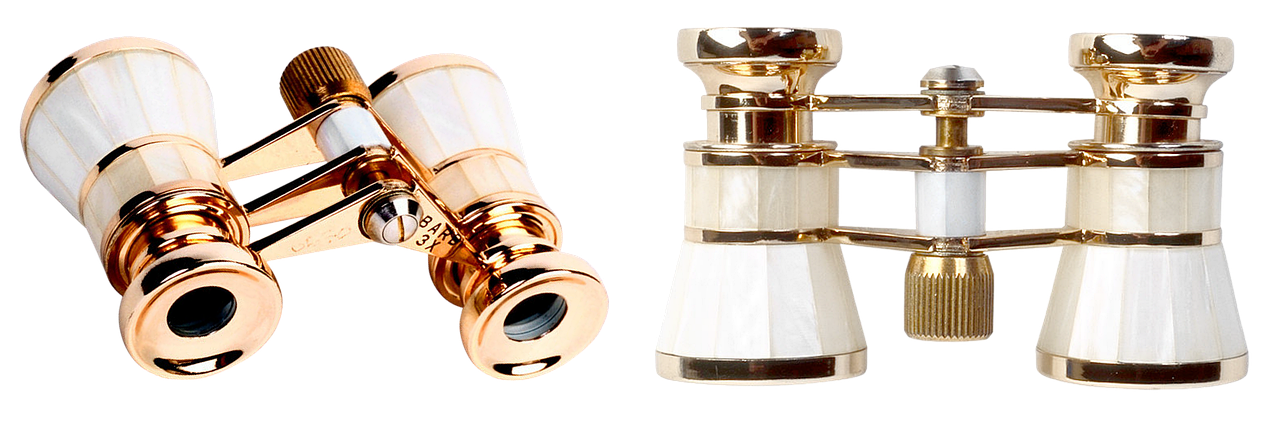
Reducing Water Consumption
Water is one of our planet's most precious resources, yet many households waste it daily without even realizing it. When it comes to selecting home appliances, is a vital consideration for anyone looking to adopt a more sustainable lifestyle. Not only does this help conserve a finite resource, but it can also lead to significant savings on your water bill. So, how do you choose appliances that are both efficient and effective in minimizing water usage?
First and foremost, look for appliances that are explicitly designed with water efficiency in mind. For instance, modern dishwashers and washing machines often come with features that optimize water use. These appliances are engineered to use less water while still delivering excellent cleaning results. When shopping, you might come across models that boast a WaterSense label, which indicates that they meet the U.S. Environmental Protection Agency's criteria for water efficiency. This certification is a reliable indicator that you’re making a smart choice for both your home and the environment.
Next, consider the technology integrated into these appliances. Many new models come equipped with smart technology that allows you to monitor and control water usage more effectively. For example, smart washing machines can adjust the amount of water needed based on the load size, ensuring that you’re not wasting water on smaller loads. This kind of intelligent management not only conserves water but also enhances the overall efficiency of your household.
Additionally, when selecting fixtures like faucets and showerheads, opt for low-flow options. These fixtures can significantly reduce water usage without compromising performance. For instance, installing a low-flow showerhead can cut down water usage by up to 50%, making your daily routines more sustainable. It’s a simple change that can lead to substantial water savings over time.
To give you a clearer picture of how much water you can save with water-efficient appliances, consider the following table:
| Appliance Type | Traditional Water Use (gallons per load) | Water-Efficient Use (gallons per load) | Potential Savings (gallons per load) |
|---|---|---|---|
| Washing Machine | 40 | 15 | 25 |
| Dishwasher | 10 | 4 | 6 |
| Showerhead | 2.5 (per minute) | 1.5 (per minute) | 1.0 (per minute) |
As you can see, the potential savings are significant. By choosing water-efficient appliances, you not only contribute to a healthier planet but also enjoy the benefits of lower utility bills. It’s a win-win situation!
In conclusion, reducing water consumption in your home is not just about making a single purchase; it's about creating a lifestyle that prioritizes sustainability. By selecting the right appliances, utilizing smart technology, and opting for low-flow fixtures, you can make a substantial impact on your water usage. Remember, every drop counts, and your choices today can lead to a more sustainable tomorrow.
- What are water-efficient appliances? Water-efficient appliances are designed to use less water than traditional models while maintaining performance. Look for certifications like WaterSense.
- How can I reduce water consumption in my home? Consider installing water-efficient appliances, low-flow fixtures, and utilizing smart technology to monitor usage.
- Are water-saving appliances more expensive? While they may have a higher upfront cost, the long-term savings on your water bill often outweigh the initial investment.
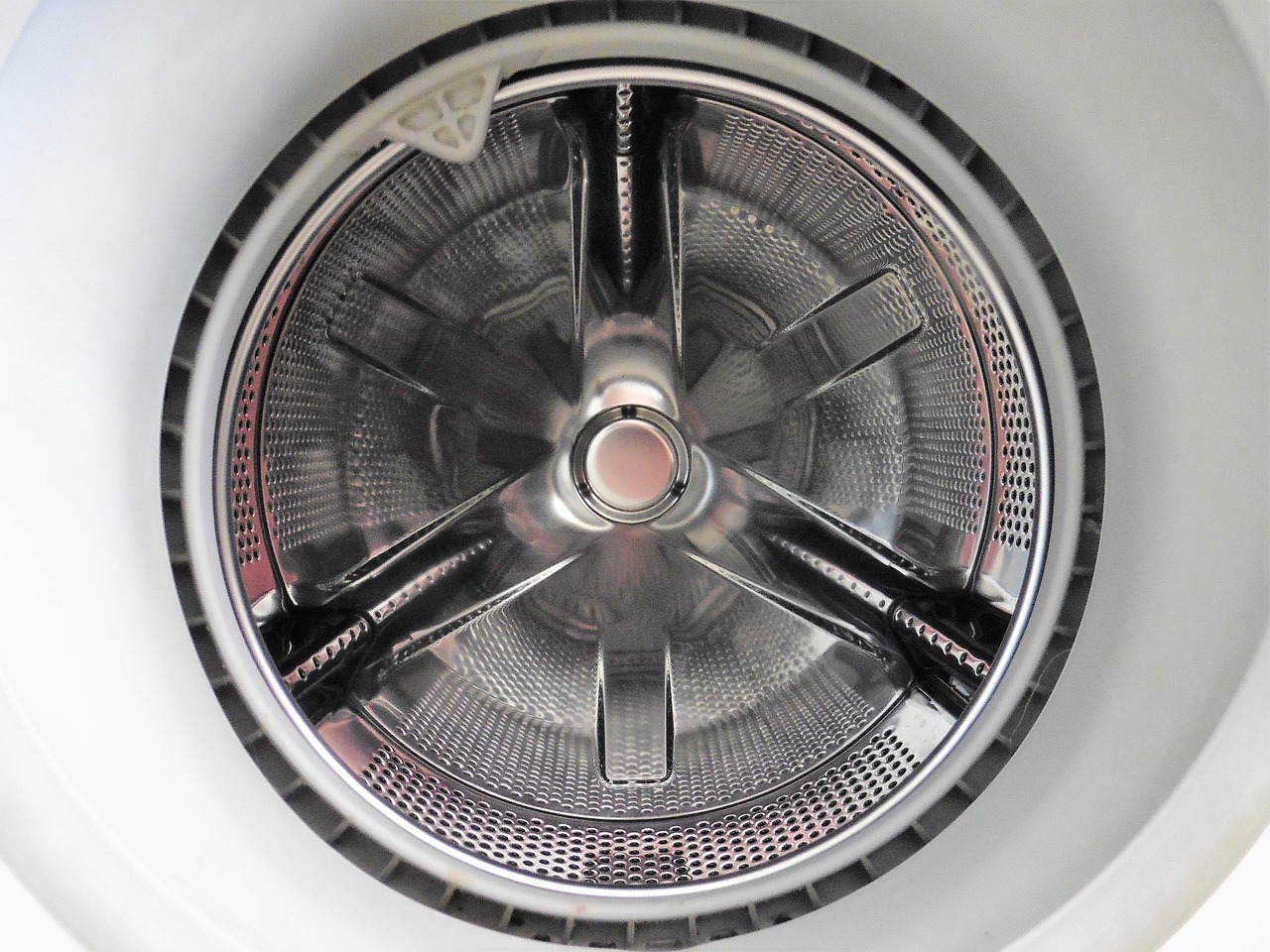
Choosing Water-Saving Appliances
In today's world, where water scarcity is becoming a pressing issue, selecting water-saving appliances is not just a choice; it's a responsibility. Imagine your home being a part of the solution rather than a contributor to the problem. By choosing appliances designed with water efficiency in mind, you can significantly reduce your household's water consumption without sacrificing performance. But how do you know which appliances truly save water? Let's dive into some key factors to consider.
First off, look for appliances that have been certified for water efficiency. Many brands now offer Energy Star or WaterSense labels, which indicate that the appliance meets strict water-saving standards. For instance, a WaterSense-labeled faucet or showerhead can save you up to 3,000 gallons of water annually compared to standard fixtures. It's like turning your home into a mini water conservation project!
Another important consideration is the technology used in these appliances. For example, modern dishwashers and washing machines come equipped with sensors that adjust water levels based on the size of the load. This feature not only optimizes water usage but also enhances cleaning performance. It's fascinating how technology has evolved to make our lives easier while also being kinder to the planet.
Moreover, it’s essential to assess the capacity of the appliance. A larger capacity often means you can do fewer loads, which translates to less water used overall. For instance, a high-efficiency washing machine may use only 15-30 gallons of water per load, compared to older models that can use up to 40 gallons. So, if you're washing more clothes in one go, you're already on the right track!
When it comes to dishwashers, choosing one that uses less than 4 gallons per cycle can make a huge difference. This is especially relevant when you consider that hand washing dishes can use up to 27 gallons of water. By switching to a water-efficient dishwasher, you’re not just saving water; you’re also saving time and effort!
Lastly, think about the installation and maintenance of these appliances. Proper installation can ensure that your water-saving features work effectively. Regular maintenance is also crucial; check for leaks and ensure that your appliances are functioning at their best. A small leak can waste gallons of water over time, negating the benefits of your water-saving appliances.
In conclusion, choosing water-saving appliances is a smart investment for both your wallet and the environment. By being mindful of certifications, technology, capacity, and maintenance, you can make informed decisions that contribute to a more sustainable future. So, as you shop for your next appliance, remember: every drop counts!
- What are the benefits of using water-saving appliances?
Water-saving appliances help conserve water, reduce utility bills, and minimize environmental impact. - How can I tell if an appliance is water-efficient?
Look for certifications such as Energy Star or WaterSense labels, which indicate compliance with water-saving standards. - Do water-saving appliances perform as well as traditional ones?
Yes, many modern water-saving appliances are designed to enhance performance while using less water. - Can I install water-saving devices in my existing appliances?
Yes, there are various retrofitting options available, such as low-flow showerheads and faucet aerators.
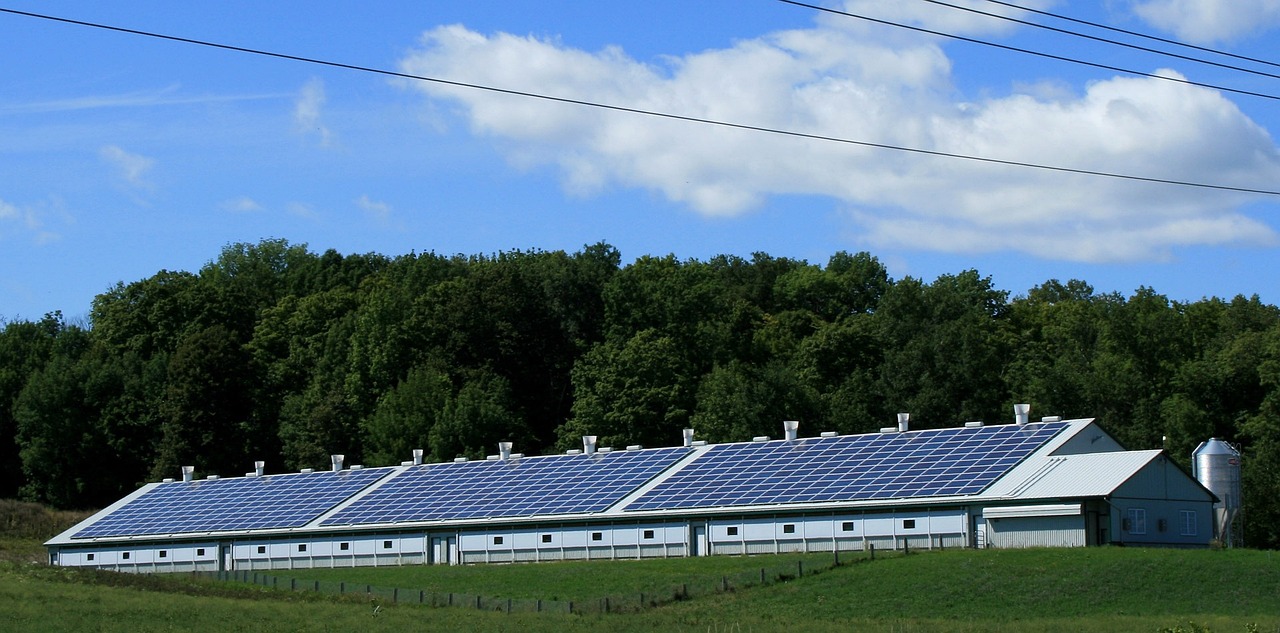
Smart Technology for Water Management
In today's fast-paced world, the integration of smart technology into our home appliances has revolutionized the way we manage resources, particularly water. Imagine having a washing machine that not only cleans your clothes but also knows the optimal amount of water needed for each load. This is the magic of smart water management technology. These appliances are designed to monitor and adjust their water usage based on several factors, such as load size, fabric type, and even the hardness of the water. By doing this, they help in significantly reducing water wastage while ensuring that your laundry comes out sparkling clean.
Furthermore, many smart appliances come equipped with real-time monitoring features. This means you can track your water consumption right from your smartphone. Have you ever wondered how much water your dishwasher uses per cycle? With smart technology, you can access this data at your fingertips, allowing you to make informed decisions about your water usage. For instance, if you notice that your dishwasher is consuming more water than usual, you might consider running it only when it's full or adjusting the settings for lighter loads.
Another exciting aspect of smart water management is the ability to receive alerts and notifications. Some appliances can send you reminders to check for leaks or notify you when they are using more water than expected. This proactive approach not only saves water but also prevents costly repairs and damage to your home. Imagine receiving a notification on your phone that your washing machine is leaking; you can address the issue immediately rather than waiting for it to cause significant damage.
Moreover, the integration of smart technology can also extend to irrigation systems in your garden. Smart irrigation controllers can adjust watering schedules based on weather forecasts, soil moisture levels, and even the type of plants you have. This means your garden gets the right amount of water it needs without overwatering, which is a common mistake many homeowners make. The result? A lush garden and a significant reduction in water bills!
To summarize, embracing smart technology for water management in your home isn't just a trend—it's a sustainable choice that benefits both your household and the environment. By investing in smart appliances, you’re not only optimizing your water usage but also contributing to a more sustainable future. So, the next time you’re in the market for a new appliance, consider how smart technology can help you manage your water consumption more effectively.
- What are smart appliances?
Smart appliances are devices that use technology to enhance their functionality, often allowing for remote monitoring and control via smartphones or other devices. - How do smart appliances save water?
They utilize sensors and algorithms to optimize water usage based on the specific needs of each task, ensuring minimal waste. - Can I retrofit my existing appliances with smart technology?
In some cases, yes! There are smart home devices available that can be added to existing appliances to monitor and manage their usage. - Are smart appliances expensive?
While they may have a higher upfront cost, the savings on water bills and the benefits of reduced waste often outweigh the initial investment.

Longevity and Durability
When it comes to choosing home appliances, longevity and durability are two vital factors that can significantly impact your overall sustainability efforts. Think of your appliances as investments; the longer they last, the less frequently you'll need to replace them, which means less waste and a smaller carbon footprint. So, how do you ensure that the appliances you choose are built to last?
First, consider the materials used in the construction of the appliance. High-quality materials not only enhance durability but also contribute to the appliance's overall performance. For instance, stainless steel is often a better choice than plastic for kitchen appliances because it resists wear and tear, making it a more sustainable option in the long run. Additionally, appliances made from recyclable materials can further reduce your environmental impact.
Another important aspect to consider is the manufacturer's reputation. Brands that prioritize quality often invest in better engineering and testing processes, leading to appliances that can withstand daily use without breaking down. Reading reviews and asking friends or family for recommendations can provide valuable insights into which brands are known for their reliability.
Moreover, a robust warranty is a strong indicator of an appliance's durability. Warranties typically reflect the manufacturer's confidence in their product. Look for appliances that come with extended warranties, as these often cover not just the appliance itself but also parts and labor for repairs. A warranty that lasts five years or more is a good sign that the manufacturer believes in the longevity of their product.
Another critical factor is the availability of support services. An appliance is only as good as the support you can get when something goes wrong. Check if the manufacturer offers reliable customer service, including easy access to replacement parts and repair services. This can save you from the hassle of having to replace an appliance prematurely.
Lastly, consider the repairability of the appliance. Some brands design their products to be easily disassembled, making repairs simpler and more cost-effective. When evaluating an appliance, ask yourself: Can I find replacement parts easily? Is the design user-friendly enough for basic repairs? A product that is easy to fix can last much longer than one that requires a complete replacement at the first sign of trouble.
| Factors to Consider | Why It Matters |
|---|---|
| Material Quality | Durable materials reduce wear and tear, enhancing longevity. |
| Manufacturer Reputation | Reliable brands often produce higher-quality, longer-lasting products. |
| Warranty Length | Longer warranties indicate confidence in the product's durability. |
| Support Services | Access to parts and repairs can extend the life of the appliance. |
| Repairability | Easy repairs prevent premature disposal and waste. |
In conclusion, investing in appliances that boast longevity and durability not only saves you money over time but also plays a crucial role in fostering a sustainable lifestyle. By paying attention to the materials used, the manufacturer's reputation, warranty details, support services, and repairability, you can make informed choices that benefit both your household and the environment.
- How can I tell if an appliance is durable? Look for high-quality materials, read reviews, and check the warranty length.
- Are energy-efficient appliances more durable? While not always the case, many energy-efficient appliances are designed with longevity in mind.
- What should I do if my appliance breaks down? Check the warranty and contact customer support for repair options.
- How can I find replacement parts for my appliance? Visit the manufacturer's website or authorized retailers for genuine parts.

Warranty and Support Services
When it comes to choosing sustainable home appliances, play a pivotal role in ensuring you make a wise investment. Think about it: when you buy an appliance, you're not just purchasing a gadget; you're committing to a long-term relationship with it. A robust warranty is like a safety net, offering you peace of mind that your appliance is covered against defects and issues that may arise over time. Typically, a good warranty will range from two to ten years, depending on the manufacturer and the type of appliance. But don’t just settle for the length of the warranty; delve deeper into what it actually covers. Does it include parts and labor? Are there any exclusions for certain components? Understanding these details can save you a lot of headaches—and money—down the line.
Moreover, reliable support services are equally crucial. Imagine you encounter a problem with your appliance; you’ll want to know that help is just a phone call away. Look for brands that offer comprehensive customer support, including 24/7 helplines, online chat options, and even local service technicians. Some companies even provide troubleshooting guides and resources online, making it easier for you to resolve minor issues without having to wait for a technician. This not only enhances your experience but also contributes to a more sustainable approach by reducing the need for unnecessary repairs and replacements.
Additionally, consider the availability of replacement parts. If a part of your appliance breaks down, it’s essential to know that you can easily find a replacement rather than having to buy a whole new unit. Some manufacturers are committed to sustainability by ensuring that their products are designed for longevity and can be repaired easily. This is where the concept of repairability comes into play—an appliance that can be easily fixed is inherently more sustainable, as it reduces waste and the demand for new products.
In summary, when evaluating warranty and support services, keep an eye out for:
- Length and Coverage: Ensure the warranty covers essential parts and labor.
- Customer Support: Look for brands that offer multiple support channels.
- Parts Availability: Research the ease of obtaining replacement parts.
By focusing on these aspects, you can ensure that the appliances you choose not only meet your sustainability goals but also provide you with the support you need throughout their lifespan.
Q: What should I look for in a warranty when purchasing a new appliance?
A: Look for warranties that cover both parts and labor for a significant duration, ideally five years or more. Check for exclusions and specific terms to understand what is covered.
Q: How can I find reliable customer support for my appliance?
A: Research reviews and ratings for the brand’s customer service. A quick call to their support line can also give you a sense of their responsiveness and helpfulness.
Q: Why is repairability important for sustainability?
A: Repairable appliances reduce waste by allowing you to fix them instead of discarding them. This contributes to a circular economy and minimizes environmental impact.

Repairability of Appliances
This article explores essential criteria for selecting eco-friendly home appliances, offering insights into energy efficiency, materials, and certifications to help consumers make informed decisions for a sustainable lifestyle.
Energy efficiency ratings are crucial for evaluating appliances. This section explains how to interpret these ratings and their significance in reducing energy consumption and costs.
The materials used in home appliances significantly affect sustainability. Here, we discuss the importance of choosing appliances made from eco-friendly, recyclable, and non-toxic materials to minimize environmental harm.
Recyclability is an essential factor when selecting appliances. This subsection examines which components can be recycled and how this impacts overall sustainability.
Understanding the end-of-life recycling process helps consumers choose appliances that can be disposed of responsibly, thereby reducing landfill waste and promoting a circular economy.
Many manufacturers now offer recycling programs for their products. This section highlights some of these initiatives and their benefits for consumers and the environment.
Certifications provide assurance that an appliance meets specific sustainability standards. This subsection outlines key certifications to look for when shopping for eco-friendly appliances.
Water efficiency is another critical aspect of sustainability. This section discusses how to select appliances that minimize water usage without compromising performance.
Water-saving appliances can significantly reduce household water consumption. Here, we explore various types of appliances, like dishwashers and washing machines, that are designed to be water-efficient.
Smart appliances with water management features can further enhance sustainability. This subsection examines how technology can help monitor and reduce water usage in the home.
Investing in durable appliances can lead to a more sustainable home. This section covers factors to consider when evaluating the longevity of appliances to ensure they last longer and reduce waste.
A robust warranty and reliable support services are indicators of appliance durability. This subsection discusses what to look for in warranties that reflect quality and longevity.
When it comes to sustainability, the repairability of appliances plays a pivotal role. Choosing appliances that are designed to be easily repaired can significantly extend their lifespan, which in turn reduces waste. In a world where we often discard items at the first sign of trouble, opting for products that can be fixed rather than thrown away is not just practical but also environmentally friendly. Think of it like mending a favorite pair of jeans instead of buying a new one; it’s more sustainable and often more satisfying.
To assess the repairability of an appliance, consider the following factors:
- Availability of Spare Parts: Check if the manufacturer provides spare parts for their products. Appliances that have readily available parts are generally easier to repair.
- Design Complexity: Simpler designs are usually easier to fix. Look for appliances that don’t require specialized tools or skills for repairs.
- User Manuals: A good user manual can make a world of difference. Manuals that provide clear instructions for troubleshooting and repairs empower consumers to fix minor issues themselves.
Moreover, some manufacturers are now embracing the concept of modular design, where individual components can be replaced or upgraded without needing to discard the entire appliance. This approach not only promotes sustainability but also encourages innovation in product design. By investing in appliances that prioritize repairability, you’re not just making a purchase; you’re making a statement about your commitment to a greener future.
1. What should I look for when choosing sustainable appliances?
When selecting sustainable appliances, consider energy efficiency ratings, the materials used, certifications, water consumption, and repairability.
2. How can I find out if an appliance is energy efficient?
Look for the Energy Star label or similar certifications that indicate the appliance meets strict energy efficiency guidelines.
3. Are there specific brands known for sustainable appliances?
Yes, many brands focus on sustainability, including Bosch, LG, and Samsung. Researching and comparing brands can help you make an informed choice.
4. What is the benefit of choosing appliances made from recyclable materials?
Choosing recyclable materials helps reduce waste and promotes a circular economy, ensuring that products can be reused rather than ending up in landfills.
5. How can I ensure my appliances last longer?
Investing in durable appliances, opting for those with good warranties, and choosing repairable models can all contribute to longer-lasting products.
Frequently Asked Questions
-
What are energy efficiency ratings and why are they important?
Energy efficiency ratings indicate how effectively an appliance uses energy. They are crucial because choosing appliances with higher ratings can significantly reduce your energy consumption and lower your utility bills. Think of it like choosing a car; just as a fuel-efficient vehicle saves you money on gas, energy-efficient appliances save you money on electricity.
-
How can I determine if an appliance is made from eco-friendly materials?
Look for appliances that specify the materials used in their construction. Eco-friendly appliances often use recyclable, non-toxic materials. Additionally, certifications like Energy Star or similar eco-labels can provide assurance that the product meets environmental standards. It's like shopping for organic food; you want to know what's in it!
-
What components of appliances can be recycled?
Many appliance components can be recycled, including metals, plastics, and glass. It's essential to check with local recycling programs to see what materials they accept. By choosing appliances with recyclable parts, you're contributing to a circular economy, much like returning bottles for a refund!
-
Why is end-of-life recycling important?
End-of-life recycling helps ensure that appliances are disposed of responsibly, reducing landfill waste. When appliances are recycled, valuable materials can be recovered and reused, which is vital for sustainability. It's similar to cleaning out your closet; recycling old clothes can help others while keeping waste out of landfills.
-
What certifications should I look for when buying sustainable appliances?
Look for certifications such as Energy Star, WaterSense, or other eco-labels that indicate compliance with sustainability standards. These certifications act as a badge of honor for appliances, assuring you that they meet specific environmental criteria. It's like getting a gold star for good behavior!
-
How can I find water-saving appliances?
Check the labels on appliances like dishwashers and washing machines for water efficiency ratings. Many modern appliances are designed to use less water without sacrificing performance. It's akin to finding a great restaurant that offers delicious meals without breaking the bank!
-
What role does smart technology play in water management?
Smart appliances often come with features that monitor and manage water usage, helping you conserve water more effectively. These technologies can alert you to leaks or inefficiencies, making it easier to maintain a sustainable home. Think of it as having a personal trainer for your water usage!
-
How can I assess the longevity of an appliance before purchasing?
Look for reviews and ratings that discuss an appliance's durability. Additionally, consider the warranty offered; a longer warranty often indicates confidence in the product's longevity. It's like buying a pair of shoes; you want something that will last through many adventures!
-
Why is repairability important for sustainability?
Choosing appliances that are easy to repair can extend their lifespan, reducing waste. When appliances can be fixed rather than replaced, it lessens the environmental impact. It's much like maintaining a classic car; with the right care, it can last for decades!
-
What should I look for in warranties and support services?
Look for warranties that cover a significant period and include comprehensive support services. Good warranties often reflect the manufacturer's confidence in their product's durability and repairability. It's similar to having a safety net; you want to know you're covered if something goes wrong!

